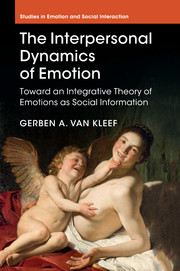 The Interpersonal Dynamics of Emotion
The Interpersonal Dynamics of Emotion Book contents
- The Interpersonal Dynamics of Emotion
- Studies in Emotion and Social Interaction
- The Interpersonal Dynamics of Emotion
- Copyright page
- Dedication
- Contents
- Figures
- Tables
- Preface
- Book part
- Chapter 1 Emotion
- Part I Emotions as Social Information Theory
- Part II Social effects of emotions: the empirical record
- Part III Conclusions, implications, and new directions
- CHAPTER 10 Critical evaluation, theoretical integration, and implications
- Chapter 11 Caveats and future directions
- References
- Author Index
- Subject Index
- Studies in Emotion and Social Interaction
CHAPTER 10 - Critical evaluation, theoretical integration, and implications
from Part III - Conclusions, implications, and new directions
Published online by Cambridge University Press: 05 April 2016
- The Interpersonal Dynamics of Emotion
- Studies in Emotion and Social Interaction
- The Interpersonal Dynamics of Emotion
- Copyright page
- Dedication
- Contents
- Figures
- Tables
- Preface
- Book part
- Chapter 1 Emotion
- Part I Emotions as Social Information Theory
- Part II Social effects of emotions: the empirical record
- Part III Conclusions, implications, and new directions
- CHAPTER 10 Critical evaluation, theoretical integration, and implications
- Chapter 11 Caveats and future directions
- References
- Author Index
- Subject Index
- Studies in Emotion and Social Interaction
Summary
- Type
- Chapter
- Information
- The Interpersonal Dynamics of EmotionToward an Integrative Theory of Emotions as Social Information, pp. 197 - 222Publisher: Cambridge University PressPrint publication year: 2016
